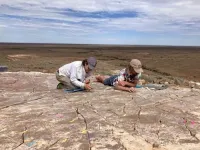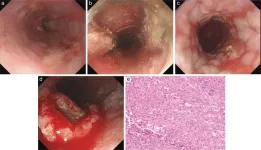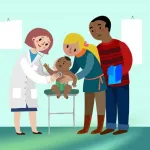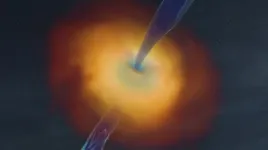(Press-News.org) About The Study: The results of this study suggest a disproportionate burden of cardiovascular-kidney-metabolic syndrome by social determinants of health and sex. These findings highlight the need to address inequities in cardiovascular-kidney-metabolic syndrome through targeted interventions.
Corresponding Author: To contact the corresponding author, Jie Guo, PhD, email jie.guo@ki.se.
To access the embargoed study: Visit our For The Media website at this link https://media.jamanetwork.com/
(doi:10.1001/jamanetworkopen.2024.45309)
Editor’s Note: Please see the article for additional information, including other authors, author contributions and affiliations, conflict of interest and financial disclosures, and funding and support.
# # #
Embed this link to provide your readers free access to the full-text article This link will be live at the embargo time http://jamanetwork.com/journals/jamanetworkopen/fullarticle/10.1001/jamanetworkopen.2024.45309?utm_source=For_The_Media&utm_medium=referral&utm_campaign=ftm_links&utm_term=111824
About JAMA Network Open: JAMA Network Open is an online-only open access general medical journal from the JAMA Network. On weekdays, the journal publishes peer-reviewed clinical research and commentary in more than 40 medical and health subject areas. Every article is free online from the day of publication.
END
Prevalence of cardiovascular-kidney-metabolic syndrome stages by social determinants of health
JAMA Network Open
2024-11-18
ELSE PRESS RELEASES FROM THIS DATE:
Tiny worm makes for big evolutionary discovery
2024-11-18
Everyone has a past. That includes the millions of species of insects, arachnids, and nematode worms that make up a major animal group called the Ecdysozoa.
Until recently, details about this group’s most distant past have been elusive. But a UC Riverside-led team has now identified the oldest known ecdysozoan in the fossil record and the only one from the Precambrian period. Their discovery of Uncus dzaugisi, a worm-like creature rarely over a few centimeters in length, is described in a paper published today in Current ...
Cause of the yo-yo effect deciphered
2024-11-18
Anyone who has ever tried to get rid of a few extra kilos knows the frustration: the weight drops initially, only to be back within a matter of weeks – the yo-yo effect has struck. Researchers at ETH Zurich have now been able to show that this is all down to epigenetics.
Epigenetics is the part of genetics that’s based not on the sequence of genetic building blocks but on small yet characteristic chemical markers on these building blocks. The sequence of building blocks has evolved over a long period of time; we all inherit them from our parents. Epigenetic markers, on the other hand, are more dynamic: environmental factors, our eating habits and the condition of our body ...
Suicide rates for young male cancer survivors triple in recent years
2024-11-18
LOS ANGELES — New research published in JAMA Network Open from USC Norris Comprehensive Cancer Center, part of Keck Medicine of USC, suggests that among all cancer survivors, male adolescents and young adults (AYA) have the highest rate of death by suicide.
The study also reports that the number of suicide deaths in the AYA male cancer survivor group (ages 15-39) increased three-fold during the 21-year-study period. In 2021, one in 65 deaths among the group was attributed to suicide. Suicide deaths have also increased for other cancer ...
Achalasia and esophageal cancer: A case report and literature review
2024-11-18
Achalasia is primarily caused by the degeneration of the myenteric plexus in the esophageal wall, leading to impaired relaxation of the lower esophageal sphincter (LES) and loss of esophageal peristalsis. Although the exact etiology is not fully understood, it is believed to involve autoimmune mechanisms and viral infections. Key pathological features include the absence of peristalsis, LES hypertonicity, and symptoms such as dysphagia and regurgitation. In this condition, the esophagus fails to contract and move food toward the stomach, while the LES ...
Authoritative review makes connections between electron density topology, future of materials modeling and how we understand mechanisms of phenomena in familiar devices at the atomistic level
2024-11-18
2024 marks an important milestone with the publication of a comprehensive review in Chemical Reviews on electron density-based methods. The review, authored by an international team, was spearheaded by leading researchers from Institute of Science Tokyo (Sergei Manzhos and Manabu Ihara of the Ihara-Manzhos lab) and included collaborators from Canada (Paul Ayers of McMaster University and Cherif Matta of Mount Saint Vincent University), China (Samantha Jenkins of Hunan Normal University), and the USA (Michele Pavanello from Rutgers University). The project also saw significant contributions from young researchers, Daniel Koch from ...
Understanding neonatal infectious diseases in low- and middle-income countries: New insights from a 30-year study
2024-11-18
Researchers from Peking University have conducted an in-depth study on the epidemic status, secular trends, and risk factors of 15 common neonatal infectious diseases across low- and middle-income countries (LMICs) from 1990 to 2019. The study, published in Health Data Science, provides a comprehensive overview of the changes in incidence and mortality rates, identifying key trends and potential areas for targeted public health interventions to improve neonatal health outcomes.
Neonatal infectious diseases remain a significant cause of morbidity and mortality in LMICs, where newborns are particularly vulnerable to infections due to underdeveloped immune systems ...
This year’s dazzling aurora produced a spectacular display… of citizen science
2024-11-18
Citizen scientists in Japan enabled researchers to learn why May 2024’s aurora appeared a magenta color over the country. This effort in extending research beyond academies and laboratories has greater consequence for humanity than explaining pretty lights
Around the world, the historic geomagnetic superstorm of late spring 2024 inspired millions of non-scientists around the world—many armed with highly sensitive smartphone cameras—to take a fantastic, unprecedented number of images of the aurora it produced.
In ...
New oral drug to calm abdominal pain
2024-11-18
University of Queensland researchers have developed a new class of oral painkillers to suppress chronic abdominal pain that is based on the peptide hormone oxytocin that drives childbirth contractions.
Associate Professor Markus Muttenthaler from UQ’s Institute for Molecular Bioscience led a team that has changed the chemical structure of oxytocin to make it gut-stable after earlier work revealed the hormone could treat abdominal pain.
Dr Muttenthaler said there was an urgent need for new ...
New framework champions equity in AI for health care
2024-11-18
(Toronto, November 18, 2024) A recent study published in the Journal of Medical Internet Research introduced the EDAI framework, a comprehensive guideline designed to embed equity, diversity, and inclusion (EDI) principles throughout the artificial intelligence (AI) lifecycle. Led by Dr Samira Abbasgholizadeh-Rahimi, PhD, the Canada Research Chair (Tier II) in AI and Advanced Digital Primary Health Care, the research addresses a significant gap in current AI development and implementation practices in health and oral health care, which often overlook critical EDI factors. With EDAI, AI ...
We finally know where black holes get their magnetic fields: Their parents
2024-11-18
Black holes are one of the most enigmatic stellar objects. While best known for swallowing up their surroundings into a gravity pit from which nothing can escape, they can also shoot off powerful jets of charged particles, leading to explosive bursts of gamma rays that can release more energy in mere seconds than our sun will emit in its entire lifetime. For such a spectacular event to occur, a black hole needs to carry a powerful magnetic field. Where this magnetism comes from, however, has been a long-standing ...
LAST 30 PRESS RELEASES:
Novel camel antimicrobial peptides show promise against drug-resistant bacteria
Scientists discover why we know when to stop scratching an itch
A hidden reason inner ear cells die – and what it means for preventing hearing loss
Researchers discover how tuberculosis bacteria use a “stealth” mechanism to evade the immune system
New microscopy technique lets scientists see cells in unprecedented detail and color
Sometimes less is more: Scientists rethink how to pack medicine into tiny delivery capsules
Scientists build low-cost microscope to study living cells in zero gravity
The Biophysical Journal names Denis V. Titov the 2025 Paper of the Year-Early Career Investigator awardee
Scientists show how your body senses cold—and why menthol feels cool
Scientists deliver new molecule for getting DNA into cells
Study reveals insights about brain regions linked to OCD, informing potential treatments
Does ocean saltiness influence El Niño?
2026 Young Investigators: ONR celebrates new talent tackling warfighter challenges
Genetics help explain who gets the ‘telltale tingle’ from music, art and literature
Many Americans misunderstand medical aid in dying laws
Researchers publish landmark infectious disease study in ‘Science’
New NSF award supports innovative role-playing game approach to strengthening research security in academia
Kumar named to ACMA Emerging Leaders Program for 2026
AI language models could transform aquatic environmental risk assessment
New isotope tools reveal hidden pathways reshaping the global nitrogen cycle
Study reveals how antibiotic structure controls removal from water using biochar
Why chronic pain lasts longer in women: Immune cells offer clues
Toxic exposure creates epigenetic disease risk over 20 generations
More time spent on social media linked to steroid use intentions among boys and men
New study suggests a “kick it while it’s down” approach to cancer treatment could improve cure rates
Milken Institute, Ann Theodore Foundation launch new grant to support clinical trial for potential sarcoidosis treatment
New strategies boost effectiveness of CAR-NK therapy against cancer
Study: Adolescent cannabis use linked to doubling risk of psychotic and bipolar disorders
Invisible harms: drug-related deaths spike after hurricanes and tropical storms
Adolescent cannabis use and risk of psychotic, bipolar, depressive, and anxiety disorders
[Press-News.org] Prevalence of cardiovascular-kidney-metabolic syndrome stages by social determinants of healthJAMA Network Open





